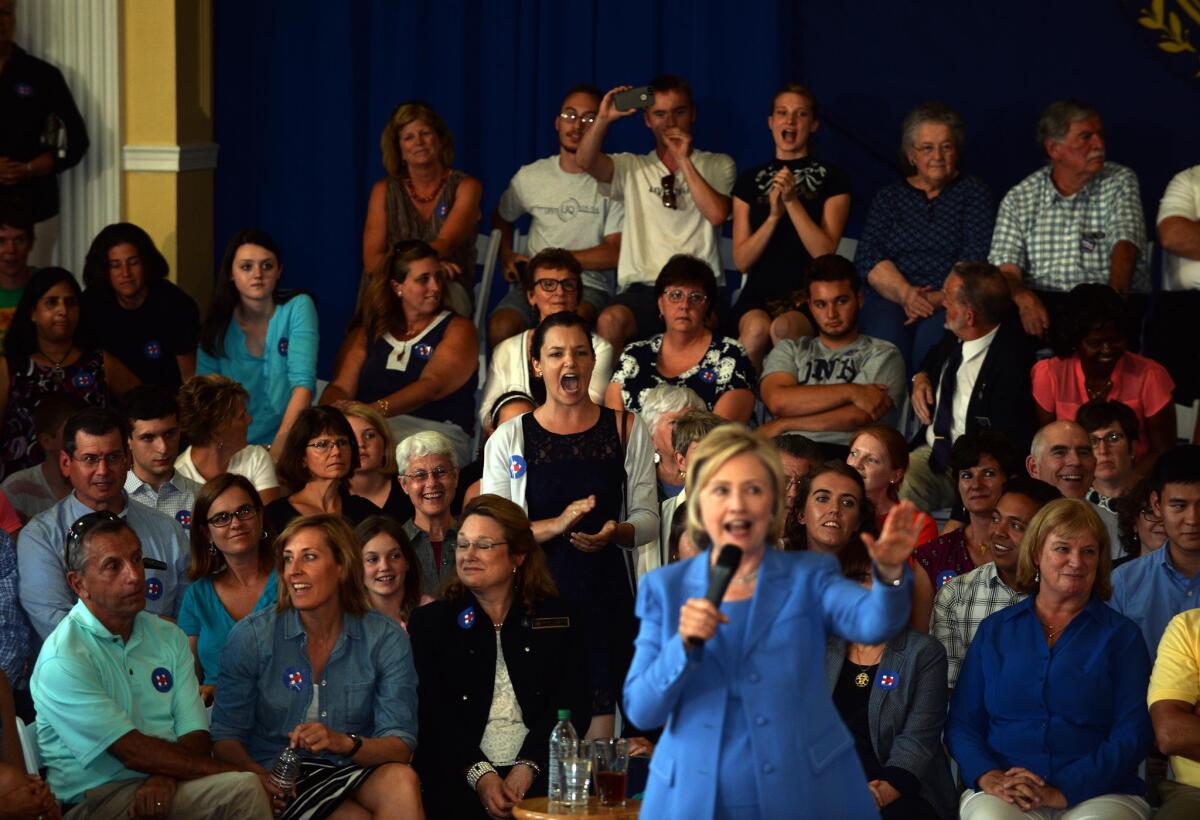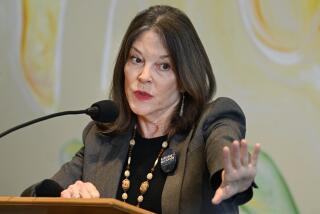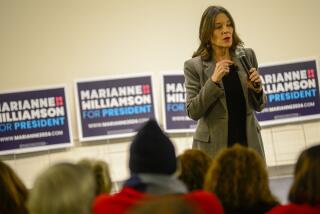Hillary Clinton, in New Hampshire, declines to commit to liberal wish list

Hillary Rodham Clinton spoke about the economy, the nuclear deal with Iran and other issues in Dover, N.H., on Thursday at the first town hall of her 2016 presidential campaign. She was briefly interrupted by a protester.
Opening herself to the unpredictability of a New Hampshire town hall audience Thursday, Hillary Rodham Clinton signaled the limits of her willingness to bend to liberal Democrats’ wishes by refusing to commit to a ban on fracking.
Clinton, the former secretary of State, was peppered with largely friendly and sometimes parochial concerns for well over an hour in a quaint auditorium in Dover’s City Hall in the first town hall event in her 2016 campaign. One voter, for instance, asked a question involving the dwarf planet Pluto. Another complained about telemarketers.
But the gathering grew contentious when a woman representing an environmental advocacy group pressed Clinton on whether she would support banning fossil fuel extraction on public lands, including the use of hydraulic fracturing, the controversial natural gas drilling technique commonly known as fracking.
Clinton had said in response to an initial yes-or-no question that she could not commit to such a ban until alternative sources of fuel were in place.
“That may not be a satisfactory answer to you, but I have to take the responsible [approach],” she said. “We still have to run the economy. We still have to turn on the lights.”
When a second individual raised the issue again and accused her of failing to lead on climate change, others joined in a coordinated chant of “Act on climate.” But Clinton held firm and used the moment to shake the impression that her policy views are shaped more by public opinion than personal conviction.
“I know what the right answer in terms of getting votes would have been,” she said. “I totally respect the passion and the urgency. We have a lot of work to do.”
The Democratic primary campaign has revolved around how Clinton handles an activist base that is seen as more liberal than she is, primarily on the economy. The upstart campaign of Sen. Bernie Sanders of Vermont has shown surprising support both here in neighboring New Hampshire and nationally.
Energy and the environment are issues that mobilize the left, and President Obama has used the regulatory authorities of the Environmental Protection Agency to pursue major initiatives to stem the effect of climate change.
Clinton praised the steps Obama has taken and said the next president must go as far as possible using executive authority in the face of a likely Republican Congress. But she said it would be irresponsible of her to commit now to taking steps that she might view later as a risk to the economy, saying fossil fuels had to be part of the nation’s energy mix until renewable sources could make up the difference.
Speaking later with reporters, Clinton said she would roll out more of her agenda in the coming weeks on addressing climate change.
“Clearly this is an issue that understandably sparks very strong feelings, and I respect that,” she said. “But I also want to be very candid with people, that if this were easy it would have already been done.”
The advocates who posed the questions said her response was insufficient and disappointing.
“We haven’t made the energy transition that Secretary Clinton is talking about because of the influence of the fossil fuel industry. And that’s why we decided to take action today, because we feel like she’s not taking this issue seriously,” said Giselle Hart, who represented a group called 350 Action.
On the Obama administration’s pursuit of a nuclear agreement with Iran, Clinton said she supported the tentative deal reached this week. She told the audience that she spent much of her first two years as secretary of State rallying global support for the sanctions that prompted Iran to negotiate.
She said critics raised legitimate concerns about the accord, which she said had “pluses” and “drawbacks” but overall was in the United States’ interest. She also mirrored the president’s rhetoric in asking what they would propose as an alternative.
“And when I say that, I mean not just what are our alternatives today, tomorrow and 20 years from now. What are our alternatives right now that could have gotten that lid put on in any other way?” she said.
Clinton spoke for more than an hour and a half in an increasingly uncomfortable indoor venue without air conditioning. Before taking questions she offered more detail of a plan to give tax incentives to businesses that enter into profit-sharing arrangements with their employees, one she said was simply “common sense.”
Unlike Iowa, whose caucuses are the nation’s first nominating contest, New Hampshire, the next state to vote, allows independents to cast ballots in its presidential primaries. Perhaps with that in mind, Clinton took several opportunities to portray herself as a pragmatic leader more interested in solving problems than scoring ideological points.
“What I’m proposing is not left or right so much as it is forward or backward,” she said.
Dover has special meaning for the Clintons and local Democrats who have supported the couple for decades. It was at a local Elks Lodge here on the eve of the 1992 primary that an embattled Bill Clinton pleaded with New Hampshire voters to give him a second chance and vowed to “be there for you until the last dog dies.” His second-place finish in New Hampshire revived his campaign on the way to the presidency.
For more campaign coverage, follow @mikememoli
More to Read
Start your day right
Sign up for Essential California for news, features and recommendations from the L.A. Times and beyond in your inbox six days a week.
You may occasionally receive promotional content from the Los Angeles Times.







